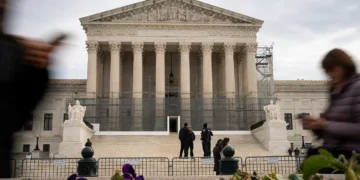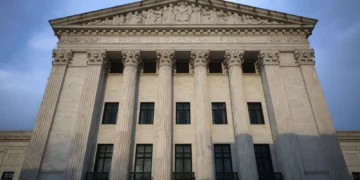Louisiana Governor Jeff Landry on Monday, July 1, 2024. (Photo by Chris Granger The Times-Picayune
Jul 3, 2024 Story by: Editor
The Louisiana Legislature’s 2022 decision not to create a majority-Black district in its congressional map, nor add more majority-Black districts to its state House and Senate maps, has led to significant legal battles. Civil rights groups argued that lawmakers violated the Voting Rights Act by diluting Black votes.
Two years later, the state has largely struggled to defend itself against these lawsuits, contesting court orders to redraw the maps and simultaneously fighting an older case regarding its Supreme Court districts. These legal efforts have proven costly, with state agencies enlisting outside firms known for defending controversial voting rights cases nationwide. One lawyer involved has been a key player in GOP redistricting efforts across the country, serving as counsel to a Republican redistricting organization.
By last November, these law firms had billed the state at least $6 million for redistricting-related services. The bulk of this expense has gone towards lawyers’ hourly fees, which ranged from $100 to $915, with fees below $200 being rare. In one month in 2023, an attorney billed over $46,000 to the Secretary of State’s office.
Additionally, the state has paid hundreds of thousands of dollars for expert witnesses. Three state agencies have been responsible for these bills: the Legislature has been charged over $3.7 million, and the Secretary of State’s office nearly $2.2 million. Former Secretary of State Kyle Ardoin was a primary defendant in two of the lawsuits.
The Louisiana Department of Justice (LADOJ), under the leadership of now-Governor Jeff Landry, also hired outside counsel. The national firm Holtzman Vogel was brought on to advise the state on voting rights and redistricting matters, billing the LADOJ at least $588,000 for services related to lawsuits over the Supreme Court, legislative, and congressional maps.
“Our office will continue to take all necessary steps to execute our responsibilities,” stated Secretary of State spokesman John Watson.
Louisiana House Speaker Phillip DeVillier, R-Eunice, expressed his surprise at the Legislature’s legal bills but chose to retain the firm BakerHostetler due to their experience with the case. “We felt like (removing them) could hurt the legislature’s case, so we chose to keep them on board,” he said, noting that Rep. Mike Johnson, R-Pineville, has been using his legal expertise to review and itemize the bills.
The central issue in the legal battle over voting maps is the number of majority-Black districts Louisiana should have. Black Louisianans comprise about a third of the state’s population, and civil rights groups argue that the number of majority-Black districts should reflect this proportion. However, the Republican-controlled Legislature’s 2022 congressional map included only one majority-Black district out of six. The legislative maps resulted in 11 out of 39 Senate districts and 29 out of 105 House districts being Black-majority.
Lawsuits claimed these maps violated Section 2 of the Voting Rights Act, which prohibits race-based discrimination in voting practices. Attorneys for civil rights groups argued that White voters controlled outcomes for 70% of legislative seats despite making up only 58% of the population. They contended that the Legislature should have created three more majority-Black Senate districts and at least six more majority-Black House districts.
An older lawsuit from 2019, in which the NAACP sued the state over its Supreme Court districts, neared resolution. The suit noted that only one out of seven districts was majority-Black.
To defend the maps, state agencies hired high-profile law firms. The LADOJ contracted Holtzman Vogel in 2019, including lawyer Jason Torchinsky, a top Republican redistricting adviser and general counsel to the National Republican Redistricting Trust. Torchinsky has also assisted Florida Governor Ron DeSantis in a controversial redistricting effort and defended a contentious legislative map in Washington state.
The Secretary of State’s office hired Nelson Mullins Riley & Scarborough, while the Legislature found separate representation with BakerHostetler. Both firms have a history of defending states in significant redistricting litigation, including North Carolina and Michigan, where they defended legislative maps that were found to dilute minority votes. Source: Nola

















